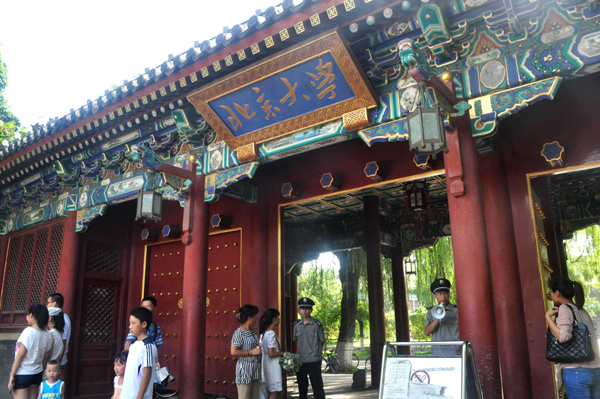


For years, Peking University in Beijing has been the top univerity in the country.[YAN DAMING/CHINA DAILY]
Seven institutions cited in Top 50 list of key subjects but still have 'a way to go'
Academic performance in key subjects at Chinese universities continues to be strong, according to newly released rankings.
Quacquarelli Symonds, a British company specializing in education and studies abroad, published its latest Worldwide University Rankings by Subject on its website recently. The rankings showed that seven universities in China this year offer subjects listed among the Top 50 around the world.
Among them, Peking University had 22 subjects, including linguistics, chemistry and law, in the global Top 50.
Tsinghua University was next, with 15 subjects in the list, including civil engineering, architecture, materials science and mechanical engineering.
The rankings were compiled from the professional opinions of 85,062 scholars and 41,910 university officials, as well as 17.3 million academic publications and more than 100 million bits of data analysis, according to a statement provided by Quacquarelli Symonds.
"Such good rankings show that China has been rewarded after investing in higher education over the past 20 years," said Ben Sowter, chief inspector of research at QS. "The success of Chinese universities also represents a global power transfer. Asian colleges have become strong competitors to those in the UK and the United States, especially in the sciences, technology, math and engineering."
The annual global university ranking by subject is a comprehensive guide to the world's top universities in a range of popular subject areas.
Previously, using schools' reputations and research citations, the rankings highlighted the 200 top universities in the world across 30 disciplines. This year, the rankings broke a record as they cover 36 subjects.
Universities of China have performed well in the QS rankings in recent years. In 2014, 26 subjects from eight Chinese universities were listed in the Top 50.
However, Jiang Guohua, academic committee director of the website cuaa.net who has watched university ranking for years, believed that people should remain calm about the results.
"Chinese universities still have a long way to go, compared with the world's top universities, and people should not be too excited about Chinese performance in world university rankings," Jiang said.
He added that the rankings enable Chinese universities to reflect on their strengths and weaknesses.
"It's undeniable that higher education in China has been developing rapidly since reform and opening-up in 1978," he said. "But generally speaking, most Chinese universities are now lingering around the medium level. There are too few world-class universities in China, considering the great number of higher education institutions in the country."
Other Chinese universities ranked were Shanghai Jiao Tong University, Fudan University, Tongji University, China Agricultural University and Beijing Normal University.
 J-11 fighters in air exercise
J-11 fighters in air exercise Beauties dancing on the rings
Beauties dancing on the rings Attendants-to-be join Mr. & Miss Campus Contest
Attendants-to-be join Mr. & Miss Campus Contest Beijing's toughest anti-smoking law takes effect
Beijing's toughest anti-smoking law takes effect Family lives in cave for about 50 years in SW China
Family lives in cave for about 50 years in SW China PLA soldiers operating vehicle-mounted guns in drill
PLA soldiers operating vehicle-mounted guns in drill Blind carpenter in E China's Jiangxi
Blind carpenter in E China's Jiangxi China hosts overseas disaster relief exercise for the first time
China hosts overseas disaster relief exercise for the first time 20 pairs of twins who will become flight attendants in Sichuan
20 pairs of twins who will become flight attendants in Sichuan Obama is sowing discontent in S.China Sea
Obama is sowing discontent in S.China Sea Rescuers work through night to reach cruise ship survivors
Rescuers work through night to reach cruise ship survivors Driving through limbo
Driving through limbo Facing down MERS
Facing down MERSDay|Week